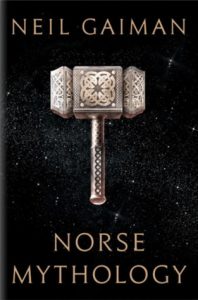
Top Ten Tuesday is a weekly meme thing hosted by The Broke and the Bookish. This week’s theme is best reads (so far) of 2017! As of writing this post, I’ve read 65 books this year, and here are the ten that I think absolutely shone. Some were released this year, but not all of them! These are also not in any kind of order!
- The Princess Diarist, by Carrie Fisher. I think, like a lot of people, I regret not having read any of Carrie Fisher’s writing before her death. This memoir is one of the funniest memoirs I’ve read in a while, and she writes with an openness and a frankness I someday aspire to have.
- Norse Mythology, by Neil Gaiman. It’s Gaiman. It’s Norse mythology.
- The Bear and the Nightingale, by Katherine Arden. A really lovely, atmospheric fairy tale with bits of Russian and Western fairy tale essences woven in. I’m really excited for the followup because so much excitement of the story seemed to happen in the last third.
- Moby-Dick; or The Whale, by Herman Melville. Uh, if you would have told me a couple of years ago that Moby-Dick would become one of my top favorite novels of all time, I might have laughed in your face. But seriously, my dudes. This is a classic case of learning about the history surrounding a novel and then diving into it, because it makes the experience all the richer. I devoured this monstrous beast of a novel in mere days. DAYS.
- The Hate U Give, by Angie Thomas. So heartbreaking, so touching, so relevant. I’ve been telling everyone to read this book.
- The Stars are Legion, by Kameron Hurley. I pitch this to people who are looking for new science fiction to read like this: Do you like military-esque, dramatic sci-fi? Do you like weird sci-fi? Do you like gross sci-fi? How do you feel about womb-punk? (What? they often ask.) I respond with a: this book is like a birth-is-war and war-is-birth kind of thing. I generally get one of two responses: I’M SOLD OMG and YOU READ SOME WEIRD SHIT, MEG. Read it, now.
- The Paper Menagerie and Other Stories, by Ken Liu. THIS JUST WON A LOCUS AWARD and has a lot of other accolades. The stories range from fantasy to sci-fi and are all well written and full of life. It’s just a good anthology, period.
- The Whole Art of Detection, by Lyndsay Faye. I don’t think I can stop babbling about this or thinking about this collection of Sherlock Holmes pastiches. They’re just so well done and evoke Doyle’s atmosphere so well while at the same time being fresh and modern. I’ll read anything Faye writes, and she’ll always be at the top of my recommendations lists.
- Borne, by Jeff VanderMeer. Flying bears? A blobby, morphing person-thing? Examinations on what it means to be a person? Yes, yes, yes. This feels like an Atwood extension that’s thoroughly VanderMeer’s stuff. If you’ve read his Southern Reach trilogy and liked it, why haven’t you picked this up yet? It’s dystopian, but it’s not an in-your-face one. Everything is centralized, and the characters are so well developed.
- Wake of Vultures, by Lila Bowen. THIS ONE CAME OUT OF NOWHERE?? I’ve seen lots of writers I like mention this and blurb for it, so when it was a Kindle daily deal, I bought it. I didn’t start reading it until a bit later, and it was everything I needed at that moment: a protagonist dealing with gender identity and expression, the old west, MONSTERS and creepy things, AH so many things that I’ll get into in a proper review soon.
THIS CONCLUDES THE TEN. I’m thinking I’ll do a ten best for the second half of the year and then do a final post narrowing those twenty down to the overall best ten of 2017!
Have you read any of these?


 Title:
Title: